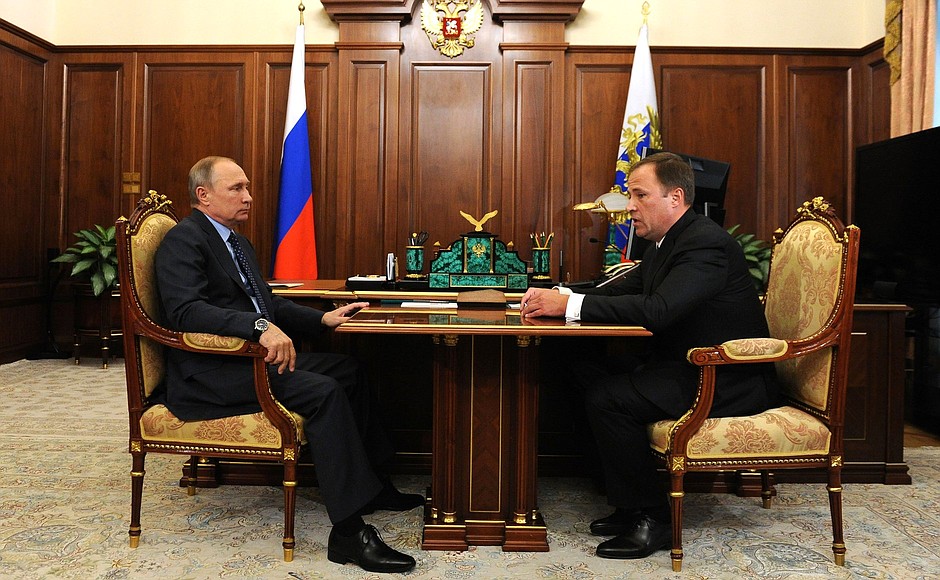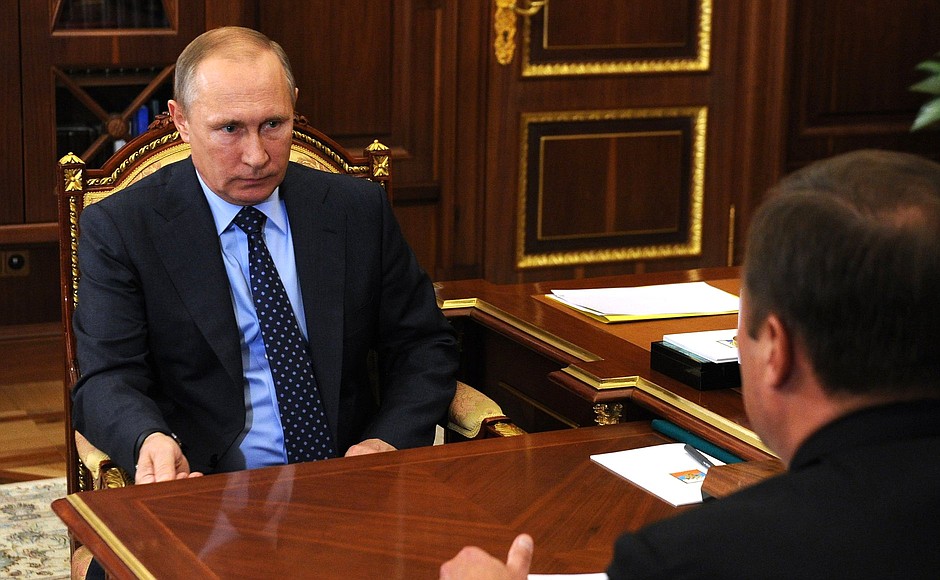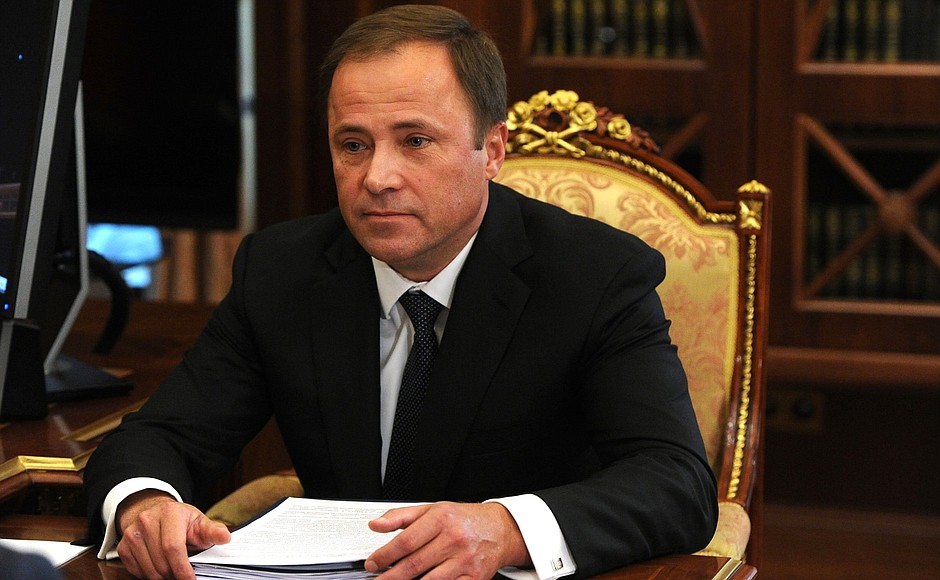Roscosmos Head informed the President about the progress in the Federal Space Programme and the latest results in the space industry.
The meeting also covered spacecraft launch preparations, satellite constellation projects, and deep space exploration, including exploration of Mars.
***
President of Russia Vladimir Putin: Mr Komarov, not so long ago we debated the organisation and reorganisation of the space industry and eventually decided to establish a state corporation. Many formalities have been overcome by now. What can you tell me about the progress? At what stage are we now?
State Corporation for Space Activities Roscosmos Head Igor Komarov: In the past year, since the Corporation’s establishment, we have built the organisation structure and hired staff. Over the same period, we began a transition to a new level of planning which required re-approval of all the existing space programmes. We re-approved three programmes out of four, including the Federal Space Programme. In summer, the GLONASS programme was updated. In the past few weeks, we finished updating the Russian State Space Programme. The pending programme concerns space launch centres. There is an issue with limits but we expect to have the programme approved shortly.
We arranged the transfer of all rights from the Federal Space Agency, which is almost finished. It should be noted that we did not suspend any current operations and continued organising the first launch from the Vostochny Space Launch Centre and designing satellite constellations. Since 2015, the constellation has added eight more spacecraft. One of the completely new projects is the development of the Luch satellite data relay network that tracks the trajectory and directs flights of over 70 spacecraft. This network was used at Vostochny to monitor and transmit telemetry as well as control signals to the space launch vehicle.
It is also very important that we have deployed a cluster of high-definition remote sensing satellites, and we have expanded this entire cluster to eight spacecraft. Three Resurs-P satellites now provide us with a new quality of data and make it possible to obtain high-definition data (with a resolution of up to 0.7 metres) from any point in the Russian Federation and elsewhere.
We are still the leaders in the number of launches, accounting for over one-third of all launches worldwide. This figure surpasses 40 percent of all launches, if we include rockets with Russian engines. At the same time, we signed a record-breaking number of contracts last year: 31 contracts, including 21 for Soyuz launch vehicles with OneWeb Co. We have also made major headway on Proton launch vehicles. We have signed a contract for ten launches for the first time in the past three or four years. The rockets will lift off in 2018–2019, but they will provide the company with work in the future, and this is very important.
Other landmark events include the March launch of ExoMars. For the first time in over ten years, we have successfully launched an expedition to Mars. In the near future, on 19 October, the spacecraft will start orbiting Mars and studying its surface (we are waiting, together with the European Space Agency, and everything is proceeding smoothly and according to plan). Its descent module will later land on Mars.
Vladimir Putin: And what then?
Igor Komarov: We will streamline the landing sequence and the equipment that will study the Martian surface. Orbital systems will study the planet’s atmosphere and provide scientists with important information. In 2020, there are plans to launch a module that would land on the planet and lift off from its surface during the next stage of the Mars exploration programme. It will scoop up materials, and streamline lift-off sequences and technologies for returning the payload and soil samples from Mars. These are important stages for scientific research.
It should also be said that we are also addressing many overdue problems with enterprises. As of early 2016, the deficit of corporate budgets was about 100 billion rubles. I have reported on the situation at the Khrunichev State Research and Production Space Centre, the Korolev Rocket & Space Corporation Energia and the Centre for Operating Facilities of Ground-Based Space Research Infrastructure, which are seen as the main problem areas.
As for project Sea Launch, we have signed a contract for purchasing Sea Launch with a Russian investor, S7, after several years of talks. This will compensate for a substantial share of current Energia losses, which total 19 billion rubles, incurred during work on the Sea Launch project over the past few years.
There were some problems such as the $330 million (about 20 billion rubles) lawsuit, which Boeing initiated against us in 2013, the risk of termination of the Sea Launch contract and a lawsuit that concerned our assets.
Last summer we signed an agreement with the Rocket and Space Corporation Energia to regulate these issues, according to which investments will be paid back from the revenues of a future joint venture. We also signed an agreement on cooperation in manned space flights, commercial flights, deep space studies, docking systems and other areas such as solar batteries, as well as the creation of a joint venture.
We believe that we will resolve this problem this year without additional investment, but by signing new contracts and strengthening our business, including by developing new technology.
As for the Khrunichev Centre, our problems with it were estimated at some 50 billion rubles at the beginning of the year. A year ago, we took out a loan from VEB Bank and redistributed the funds to repay some 25 billion rubles. Part of the funds – 10 billion – was taken at Fundservicebank, where we had an account. We also mobilised 10 billion rubles of our own funds.
I spoke with Mayor Sergei Sobyanin. We will get support from the Moscow Government, which has agreed to take over control of some of our non-core assets and the area where the Khrunichev Centre is located; we decided to talk with city hall directly, without any intermediaries or developers. We pledged to provide at least 20 billion rubles to pay Khrunichev’s debts by the end of the year. In short, this 50-bilion-ruble hole…
Vladimir Putin: So, you still owe 10 billion rubles?
Igor Komarov: No, about 5 billion rubles. We have repaid 25 billion and will pay 20 billion rubles back. We still need to find some 5 billion rubles. We will consider solutions that involve Moscow city hall or some other of our assets.
Overall, the situation is improving. I think we will settle the bulk of our companies’ problems this year and the rest of them next year.
Our companies have reported a profit of 6.5 billion rubles in the first six months of the year and are on schedule under the Federal Space Programme. We are addressing and settling our problems gradually.
Vladimir Putin: Good.
<…>


